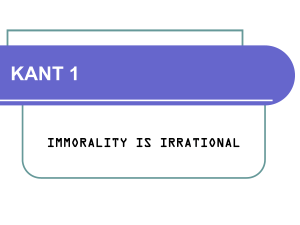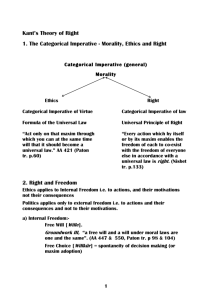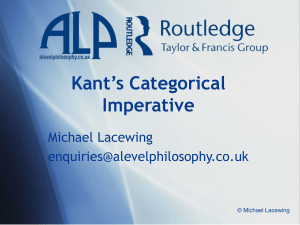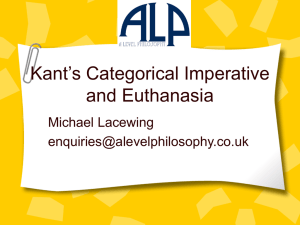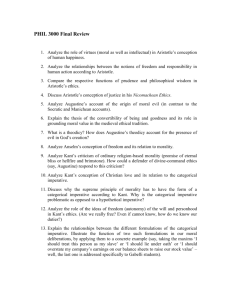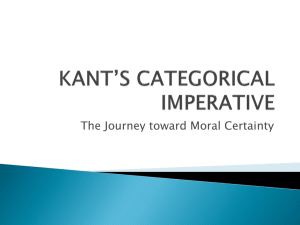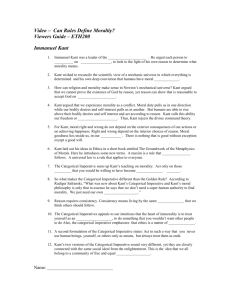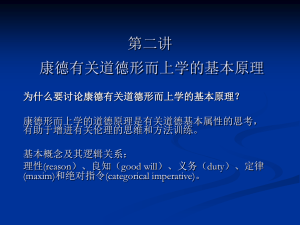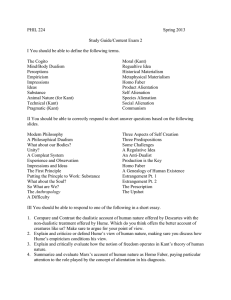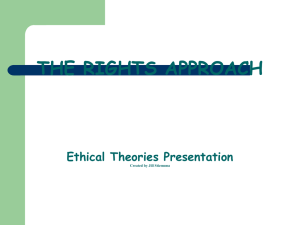KantPP
advertisement
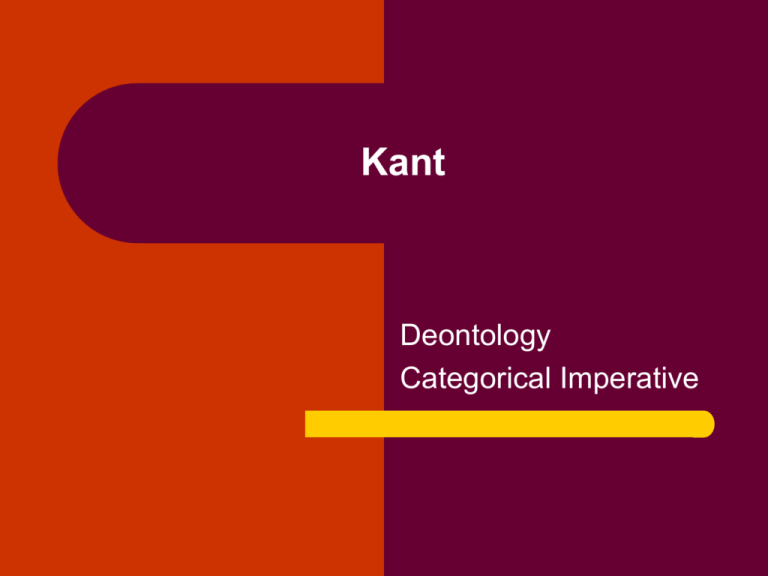
Kant Deontology Categorical Imperative Immanuel Kant 1724-1804 Profile: Dead German Time of Berkley, Rousseau, Hume, Bentham Not a fan of music or arts – preferred maths and logic Immanuel Kant 1724-1804 Lived his entire life in birth town of Konigsberg Boring – so regular housewives used to set their watches by him Key Texts Critique of Practical Reason Metaphysics & epistemology Tough! Ethics Easier Critique of Judgement Beauty Groundwork for the Metaphysics of morals Try to read Critique of Pure Reason Epistemology Rationalist Empiricist (Reason = knowledge) (Experience = knowledge) Plato Descartes Leibniz Spinoza Aristotle Hume Locke Mill Kant wants to synthesise these two opposing views Key question: “What are the necessary conditions for knowledge?” Reason + Experience = Knowledge Human mind imposes structures on the world in order to make sense of it Eg: time, space and causality Short Interlude… • Deontology • “Deon” = “Duty” • Utilitarianism=? • Teleological/ Consequentialist • Bentham et al concerned with consequence • Kant concerned with action, intention Kant’s Morality Morals have an absolute value - absolutist, realist, objectivist They’re not ‘out there’ Morality is inside of us, we all have a sense of moral duty Wants a universal moral law The Good Will The only thing of absolute value is: Intrinsically good Good without qualification - Happiness is neither “Nothing in the world can possibly be conceived which could be called good without qualification except a good will” (Groundwork) God, Immortality and Free Will The idea of God is necessary for morality to be intelligible God is the guarantee that if you do the right thing you will yield the right results There must be life after death – you might not see the results of your good actions in this life If all our actions are pre-determined then morality doesn’t apply to us Hypothetical Imperatives - Categorical Imperatives “If..,then you should…” Factual relation between a goal and how to achieve it Utilitarian “If you want maximum happiness you should not murder” “You should…” An obligation Kant “You should not murder” -morality has nothing to do with inclinations, personal gains or individual circumstances The Categorical Imperative Categorical because it is unconditional Imperative because it is a command Categorical Imperative = Unconditional Command *Because we possess rational wills *Without considering the personal benefits Where in religion do you see ‘categorical imperatives’? 1st Maxim "Act only according to that maxim whereby you can - at the same time - will that it should become a universal law.“ Universalisability “do to others as you would have done to yourself” You should only do something if you would be prepared for everyone else to do it Some examples? Another Short Interlude… • Perfect vs. Imperfect duties • Perfect duty = not to act in maxims that result in logical contradictions when we universalise them (ie. “It’s ok to steal”) • Imperfect duty = to act by maxims that we would want to be universalised (somewhat dependent on subjective preferences) 2nd Maxim "Act in such a way that you treat humanity, whether in your own person or in the person of any other, always at the same time as an end and never merely as a means to an end” You have a duty not to use people for your own end. If Hannah knew Angelina Jolie… Examples? 3rd (and final) Maxim "Therefore, every rational being must so act as if he were - through his maxim – always a legislating member in the universal kingdom of ends." Some examples… Kant was always critical of the use of examples as ‘moral yardsticks’ – they tend to rely on feelings rather than reason However….. Deception, theft, suicide, laziness, charity, cruelty to animals Synthetic A Priori We have free will We do not follow pre-determined laws We must determine a set of laws by which we will act Are these laws Analytic or Synthetic? A Priori or A Posteriori? Last Short Interlude… • Hume: Is/Ought problem • You can’t jump from an ‘is’ to an ‘ought’ • You can’t jump from descriptive to prescriptive • Hume’s Fork • Analytic-a priori- necessary • Synthetic-a posteriori-contingent Bending Hume’s Fork… A Brief Summary Deontology Absolutist/ Realist God and Free Will Categorical Imperative (unconditional command) Universalisability People as ends not means Synthetic A Priori Useful Sources: Commentary http://plato.stanford.edu/entries/kantmoral/#CatHypImp Texts http://evansexperientialism.freewebspace.com/kant_grou ndwork_metaphysics_morals01.htm http://www.sparknotes.com/
